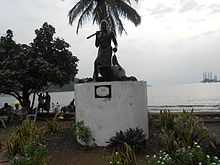Limbe, Cameroon
Coordinates: 4°01′N 9°13′E / 4.017°N 9.217°E
| Limbe | |
|---|---|
 | |
 Limbe | |
| Coordinates: 4°01′N 9°13′E / 4.017°N 9.217°E | |
| Country |
|
| region | South-West |
| Department | Fako |
| Founded | 1858 |
| Elevation | 150 m (490 ft) |
| Population (2005) | |
| • Total | 84,223 (Census) |
Limbe (1858–1982: Victoria; also spelled Limbé) is a seaside city in the South-West Region of Cameroon. Limbe was founded in 1858 on the southern slopes of Mount Cameroon by the British missionary Alfred Saker. At the 2005 Census, the population was 84,223.
History
Victoria was founded by the British missionary Alfred Saker of the Baptist Missionary Society of London in June 1858.. Due to this treaty, initially Victoria and its vicinity was not part of the new German colony Kamerun and remained under British administration. On May 7, 1886 Great Britain and Germany agreed to exchange Victoria and its vicinity for German rights at the Forcados River in Nigeria and St. Lucia in South Africa. On March 28, 1887 Victoria and its vicinity were handed over to the German administration. At the same time Swiss Presbyterian missionaries bought the land from the Baptist Missionary Society in 1887.
Victoria became British again in 1915. In 1982 Victoria was renamed and is since then known as Limbe.
Language
.jpg)
The Southwest Province's official language is English, although French is often spoken due to the city's geographic proximity to Douala, where the official language is French. Most of the population speaks Cameroonian Pidgin English. The native language of the region is Bimbia or Isubu.
Of interest

Limbe is located on a beautiful bay against the backdrop of a major mountain range. Black sand beaches make Limbe one of two coastal towns (Kribi being the other) that are popular among Western tourists. The Limbe Wildlife Centre and Limbe Botanical Gardens are notable attractions. The Germans left a Bismarck tower in the vicinity of Limbe. Limbe is considered a good region in the country in terms of night life, and is considered a good touristic city in the country to visit.It is the home to Bakwerians.

Transport
Limbe is served by a terminal station of a 600 mm (1 ft 11 5⁄8 in) gauge plantation railway.[1]
Commerce
Limbe is the center of Cameroon's oil industry. Other important industries are fishery and tourism. The Port of Limbe is one of four commercial ports in Cameroon.[2]
Industry
In 2008, Limbe became the site of a cement works.The city is also host to the head office (located at Bota, Limbe) of one of Cameroon's largest company known as the CDC. The head office is at Bota, Limbe. Limbe also has a non-operational natural sea port. Limbe, along with the rest of Cameroon, Central African Republic, and Chad, rely on all import / export activities through the port of Douala, the economic capital of Cameroon. Limbe which is a viable touristic destination in Cameroon offers touristic attractions such as the Limbe Wildlife Center, the Limbe Botanic Garden, and an extensive and almost unique dark sand public and private beaches. Several small inns and motels: Atlantic Beach, Guest House, Park and Mirama, Trinity, Savoy Palms, First International Inn (Fini), etc. are available to accommodate both business and touristic guests. Furthermore, a modern hotel facility called The Splendeur is currently under construction for completion in January 2013.
Sport
The construction of a stadium in Limbe is planned, financed by the stateowned Chinese company, the Exim Bank of China. [3]
Sister cities
 Saint-Brieuc, France
Saint-Brieuc, France Saint John's, Antigua and Barbuda
Saint John's, Antigua and Barbuda Seattle, USA
Seattle, USA
See also

- Railway stations in Cameroon
- Saker Baptist College
- National Comprehensive High School Limbe
- Government High School Limbe
References
- ↑ http://www.gouverneur-ebermaier.de/english/narrow_gauge_railways.htm
- ↑ http://www.fbodaily.com/cbd/archive/2000/05(May)/11-May-2000/Bsol007.htm
- ↑ Wikileaks: cablegate, cable 2010-02-18 (ID: 10YAOUNDE95) China's Growing Presence in Cameroon
External links
| Wikimedia Commons has media related to Limbe. |